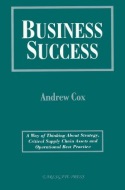Business Success: A Way of Thinking About Strategy, Critical Supply Chain Assets and Operational Best Practice

Price: £45.00
Author: Andrew Cox
Format: Hardback
No. Pages: 327
Published: May 1997
ISBN: 1-873439-76-8
Business Success provides a radical critique of current ways of thinking about how individuals and companies achieve success in business. It challenges the dominant paradigm in business and provides a new way of thinking about how success is sustained. This new way of thinking is based on the development of an understanding of how to align strategy and operational practice in supply chains rather than markets.
Business Success challenges all of the current ways of thinking about how sustainable success in business is achieved. The theoretical and practical critique focuses on the writings of leading business and economics thinkers. Particular attention is devoted to the historical influence of the works of Adam Smith on management thinking, as well as to the contemporary contributions of such writers as F.W.Taylor, Michael Porter, Hamel and Prahalad, John Kay, and Womack and Jones, amongst others. The book explains why each of these contributions is partial and provides a completely new theoretical approach to business strategy and operational practice.
Professor Cox's book fundamentally challenges the existing dominant paradigm in business based on market competitive thinking. His book provides a new way of thinking about business success, based on the principles of market closure through the ownership and control of critical supply chain assets. In creating the grounds for a paradigm shift in thinking about business success Professor Cox explains, for the first time, why it is that so much of current business thinking about strategy and operational practice fails to deliver significant performance improvements. The basic reason, Professor Cox argues, is because current business management thinking and writing has no theory, and is based on inappropriate fads and benchmarking ways of thinking about market competition. Starting from first principles the author develops a completely new way of thinking about how business success can be operationalised. The basic themes of this new way are outlined below:
TEN KEYS TO BUSINESS SUCCESS:
- It is wrong to think about business success in terms of market competition
- Focusing on critical assets in supply chains is the key to business success
- Thinking entrepreneurially about supply chain innovation and intellectual property is critical for success
- All business success is ultimately achieved by creating market closure through the ownership and control of critical intellectual property in supply chains
- Understanding the scope for minimising the copying of critical intellectual property is essential for success Market closure can be permanent, but is more likely to be temporary
- Temporary market closure occurs through the operational development of relatively superior competence
- Superior competence is linked to knowing and operationalising the four principles of effective leverage
- Developing practical guides that allow companies to understand the appropriateness of specific actions under contingent circumstances is the key to operational practice and strategic alignment
- Practical operational guides for business success will always be based on an understanding of the four dimensions of supply








If you would like to purchase this book please contact us or visit your local Amazon.